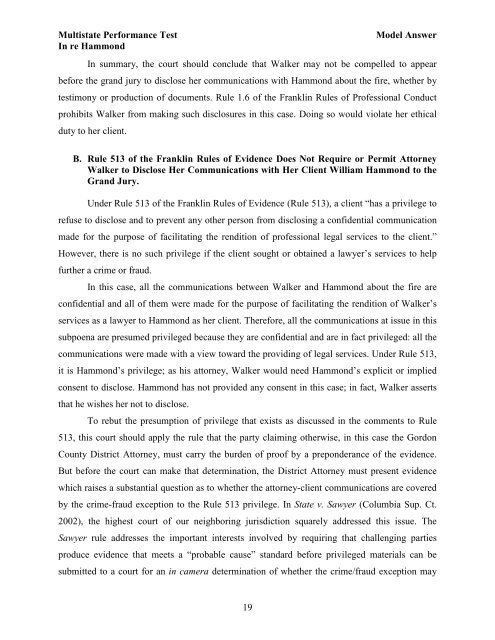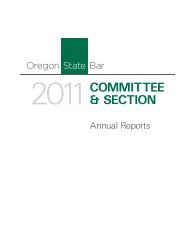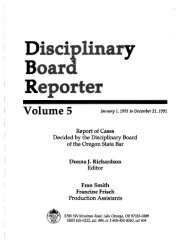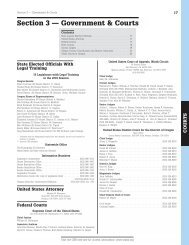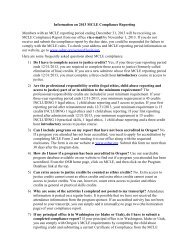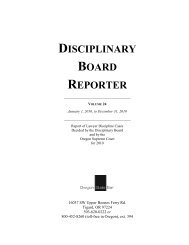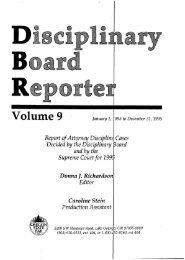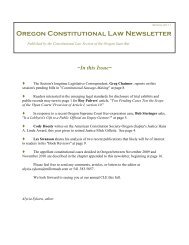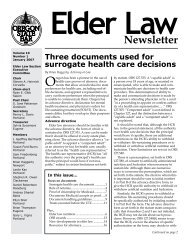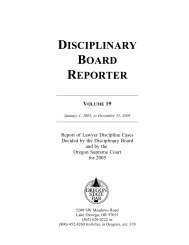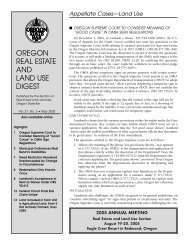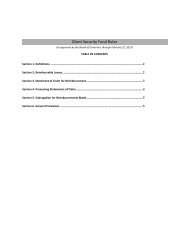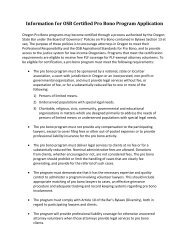MPT Grading Materials July 2010 - Oregon State Bar
MPT Grading Materials July 2010 - Oregon State Bar
MPT Grading Materials July 2010 - Oregon State Bar
You also want an ePaper? Increase the reach of your titles
YUMPU automatically turns print PDFs into web optimized ePapers that Google loves.
Multistate Performance Test<br />
Model Answer<br />
In re Hammond<br />
In summary, the court should conclude that Walker may not be compelled to appear<br />
before the grand jury to disclose her communications with Hammond about the fire, whether by<br />
testimony or production of documents. Rule 1.6 of the Franklin Rules of Professional Conduct<br />
prohibits Walker from making such disclosures in this case. Doing so would violate her ethical<br />
duty to her client.<br />
B. Rule 513 of the Franklin Rules of Evidence Does Not Require or Permit Attorney<br />
Walker to Disclose Her Communications with Her Client William Hammond to the<br />
Grand Jury.<br />
Under Rule 513 of the Franklin Rules of Evidence (Rule 513), a client “has a privilege to<br />
refuse to disclose and to prevent any other person from disclosing a confidential communication<br />
made for the purpose of facilitating the rendition of professional legal services to the client.”<br />
However, there is no such privilege if the client sought or obtained a lawyer’s services to help<br />
further a crime or fraud.<br />
In this case, all the communications between Walker and Hammond about the fire are<br />
confidential and all of them were made for the purpose of facilitating the rendition of Walker’s<br />
services as a lawyer to Hammond as her client. Therefore, all the communications at issue in this<br />
subpoena are presumed privileged because they are confidential and are in fact privileged: all the<br />
communications were made with a view toward the providing of legal services. Under Rule 513,<br />
it is Hammond’s privilege; as his attorney, Walker would need Hammond’s explicit or implied<br />
consent to disclose. Hammond has not provided any consent in this case; in fact, Walker asserts<br />
that he wishes her not to disclose.<br />
To rebut the presumption of privilege that exists as discussed in the comments to Rule<br />
513, this court should apply the rule that the party claiming otherwise, in this case the Gordon<br />
County District Attorney, must carry the burden of proof by a preponderance of the evidence.<br />
But before the court can make that determination, the District Attorney must present evidence<br />
which raises a substantial question as to whether the attorney-client communications are covered<br />
by the crime-fraud exception to the Rule 513 privilege. In <strong>State</strong> v. Sawyer (Columbia Sup. Ct.<br />
2002), the highest court of our neighboring jurisdiction squarely addressed this issue. The<br />
Sawyer rule addresses the important interests involved by requiring that challenging parties<br />
produce evidence that meets a “probable cause” standard before privileged materials can be<br />
submitted to a court for an in camera determination of whether the crime/fraud exception may<br />
19


